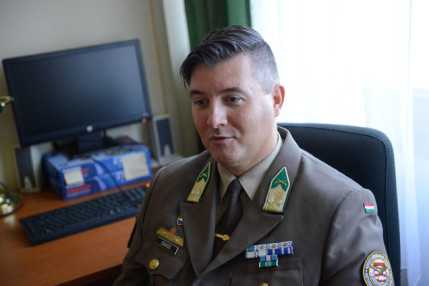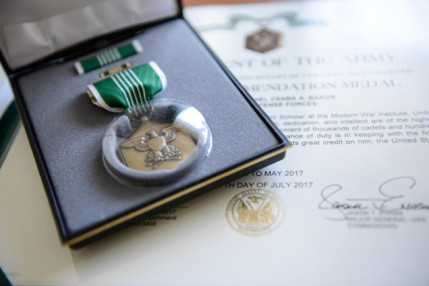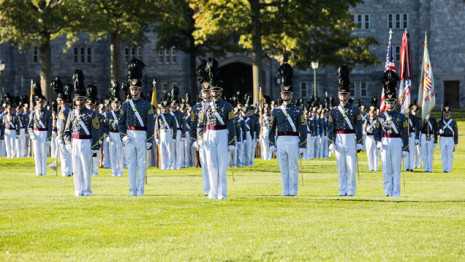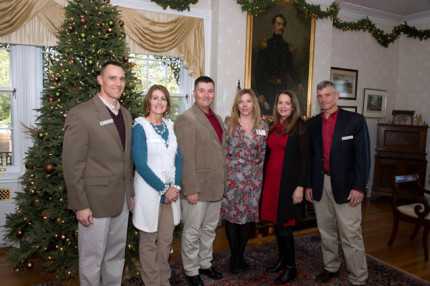“It Was Good to Be a Hungarian Officer in the World’s Premier Military Leadership Institute”
Szöveg: Ádám Draveczki-Ury | 2017. november 23. 5:39Lt.-Col. Attila Csaba Bakos – who teaches at the National University of Public Service Faculty of Military Science and Officer Training – has spent nine months as lecturer and researcher at the legendary United States Military Academy at West Point. We had a conversation with him about his experiences.

Lt.-Col. Csaba Bakos can claim to have accomplished something that no other Hungarian professional soldier has: he had opportunity to teach at the United States Military Academy (USMA) at West Point, the most famous military academy in the USA and certainly in the entire world.
“I was a PhD student in the Doctoral School of Military Science, when I was told to apply for the prestigious Fulbright Scholar grant", the lieutenant-colonel told us in answer to our question. “The initiative itself goes back to a little earlier, because on his visit to Hungary, a history professor from West Point had already informed us before that the Academy would be pleased to invite someone from here. Thus the threads became intertwined and I took a chance. Of course, the Fulbright Scholar Program itself has a history of 70 years, and one can obtain the grant only by meeting very strict eligibility requirements according to multiple criteria. Besides, the process involves independent reviewers, as the scholarship grant is part sponsored by the US State Department so the standards are high. In my case, it made a lot of difference that I am an active-duty soldier and a family man, so I embody the image the Americans want to present to the cadets by all means. That is, they want to present an ideal system in which professional soldiers have families and live a full life in every respect. Obtaining this grant was a tremendous honor to me, all the more so in light of the fact that I was the very first foreign soldier to travel as a Fulbright Scholar to the United States."

Lt.-Col. Bakos’ field of research is small wars, and he was researching various aspects of this subject at West Point too. “As for the education, in the first semester I was requested to teach comparative defence policy. This course is aimed at teaching cadets how to use different methods in assessing the defence capabilities of a given state or a non-state actor, and in comparing them with each other and those of the USA. We analyzed the intensity of a range of different armed conflicts, taking into account the extent and type of the losses to be calculated with, and so on. In the second semester, I gave lectures in the theory of counterinsurgency operations", the lieutenant-colonel told us. According to him, the US soldiers, instructors and cadets all received him open-mindedly and showed great interest. “I started my military career back in 1988, when the Soviet troops were still present in Hungary, and later the training at Kossuth Lajos Military College was also based on the principles applied by the Soviets, on the field manuals and programs that they had developed during the time spent in our country. The Russian intervention in Syria intensified in the period when I was staying abroad, so the cadets kept coming to me and asking me questions, as their approach is completely different. For example, they asked me questions as to how a conventional Russian infantry battalion is organized, how it fights and so on. Let me mention just one example of that different approach: the Americans take it as basic that a military unit will not maintain an attack after having taken 20 per cent casualties. By contrast, what I learned back then – and in fact, this is what we have been teaching to the present day – is that an attacker can remain in action until it reaches a casualty rate of 40-50 per cent. This definitely comes from the Russo-Soviet way of thinking, as this was what the large numbers showed on operations considered as conventional. And this, for instance, seemed totally incomprehensible to the Americans, as they have a different starting point."

According to Csaba Bakos, the training programs themselves are not so much different. “There is a Cadet Brigade at West Point too, which coordinates daily activities, just like the Ludovika Battalion in the Hungarian Defence Forces. They, too, place great emphasis on physical training, and both organizations conduct highly valuable academic educational and scientific activities. The difference is in the minor details. The US educational methodology rests on different foundations, as the Americans do not believe in conventional teaching methods but rather in the master/disciple-based Socratic model where students go to their mentors. Accordingly, I always assigned the material in advance, the students had time to absorb it, and then they formed syndicates to discuss it in class. In this system, instructors do not necessarily share their lexical knowledge with students, but rather act as mentors in directing the learning process. The objective is to make sure that the cadets get to know as many mentors as possible throughout their studies so they can improve their own knowledge", the lieutenant-colonel described. “Another difference is that although at West Point, all graduates are commissioned as (2nd) lieutenants, just like those in Hungary, they will start their studies after graduation in schools of their own branches of service, whereas the graduates in Hungary are already soldiers trained in their military occupational specialty, for instance, as infantry officers. At West Point, you can learn how to be an officer for a lifetime. As they say, they train future leaders for the United States Army and for the nation."
And the foregoing is not an exaggeration: the USMA at West Point has its own hospital, and accommodates some 25,000 people, among them around 4000 soldiers. “The United States Army receives officers from a great many institutions, and around 10 per cent of them come from here. Half of the generals, however, have graduated from West Point. I think that is a good indication of the quality of education", Lt.-Col. Bakos says, adding that in his opinion, the USMA absolutely deserves its legendary fame, and all cadets are very proud of having the chance to attend it. “The utmost importance of cadets pervades the whole system, and the cadets themselves are very serious about being students at West Point. The US officers’ mentality is also exemplary. They have 10 or so days of paid leave each year, but they take at most two or three days off at a time, and they really work from morning to evening, making maximum use of every minute. We in Hungary like to say as a joke that there are 24 hours plus the night in a day, but it was there that I first saw this saying put into actual practice. The pace of work they dictate is literally amazing, and they instill the same into the cadets as well. They give them responsibility so they can develop a sense of it, and this is how cadets get that inner morality that places them so high in public opinion. Of course, one contributing factor is the fact that the training system has been running uninterrupted since 1802. Again, let me give an example: if a cadet is caught cheating, a Cadet Honor Committee will review his case, which usually constitutes grounds for expulsion. The Superintendent of the Academy has discretionary right and may return the decision to the committee for reconsideration, but he does not have the final word."

Lt.-Col. Bakos added that the soldiers’ prestige is already very high by default in American society. “For example, when I went in uniform to apply for my US social security number, an elderly lady came up to me and thanked me for my service. I thanked her too, but I also asked her if she knew I am not an American. She just asked me if I was an ally of theirs, and I said yes. She said “Then thank you very much!" In Hungary, this attitude has just started to take root, and you can find it in the esteem accorded to soldiers and policemen serving in border security operations, for example. But here in Hungary, for the time being we can feel the people’s love for the soldiers only as an impulse on our skin, in time of floods, snow conditions and border service periods. All this is constantly present in the United States.
In recognition of his activities at the USMA, the lieutenant-colonel has received the prestigious US Army Commendation Medal, and he says the nine months he spent abroad were an experience for a lifetime. “The feeling of seeing this system from the inside, living on the base, walking past a cemetery where former West Point graduates have been buried since 1802 – this is indescribable. By the way, there are several Hungarians today among those soldiers who graduated from there. This is how I came into contact with one of Albert Wass’ sons, who is a US general of great repute, and I had opportunity to give a lecture together with Fred Franks, who lost a significant portion of his leg in Vietnam, but led the VII Corps in Iraq during the Gulf War in 1991 and finally retired as a four-start general. I cannot put these experiences into words, and am especially pleased that I had the chance to have my family beside me abroad to experience all these things. Not to mention that my five- and six-year old sons can speak English like natives. It was good to be a Hungarian officer in the world’s premier military leadership institute, for my recognition belonged not only to me but also to the Hungarian Defence Forces and the Hungarian officer corps.

Photos: Dénes Szilágyi (NUPS) and the archives of Lt.-Col. Attila Csaba Bakos